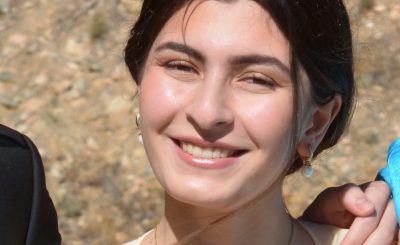In a series titled Nobel Perspective, UWC-USA students and recent alumni reflect on the Nobel Acceptance Speeches of past Nobel Peace Prize winners. They explore how the Nobel Laureate’s view of the world matches events that unfolded since the prize was awarded and what still holds true for the UWC-USA community as it seeks to encourage students and alumni to be advocates for peace.
Shrin Ebadi, who received the 2003 Nobel Peace Prize, declared that the honor would inspire women across the Muslim world to fight for equality in oppressive and patriarchal societies. The prize was awarded “for her efforts for democracy and human rights” in Iran and her “struggle for the rights of women and children.”
Born in 1947, Ebadi trained as a lawyer and received her master’s from Tehran University before becoming the first female judge in Iran in 1969. Following the 1979 Islamic Revolution, she was dismissed from her role and assigned clerical positions because women were deemed unsuitable to serve as judges by the new leaders of Iran.
Although Ebadi was given a higher role within the department of justice after she and other female judges protested this action by the regime, she was still not allowed to serve as a judge. In 1992 she obtained her lawyer’s license and set up her own practice after years of struggle because the regime initially denied her license due to her gender and previous role under the Shah’s rule. Since then, Ebadi has represented various high-profile cases involving the families of political victims, journalists, and child custody matters.
In her 2003 Nobel Acceptance Speech, she claimed that “women constitute half of the population of every country. To disregard women and bar them from active participation in political, social, economic, and cultural life would in fact be tantamount to depriving the entire population of every society of half its capability. The patriarchal culture and the discrimination against women, particularly in the Islamic countries, cannot continue for ever.”
Although Ebadi did not make a prediction that almost 20 years later the situation for women would have become better, one cannot say that there has been a lot of progress either, especially in Islamic countries. Indeed the state crackdown on civil society, imprisonment of activists, internet and social media censorship, and the restrictions on operation of organizations are all obstacles to the women’s rights movements in Iran and most other Islamic countries.
However, the main obstacle is the discriminatory and patriarchal constitution in the Islamic Republic of Iran causing institutionalized discrimination for women and other marginalized groups. Therefore, as long as the constitution does not change, the rights for women in Iran will remain the same.
At the same time as she questions her own country’s human right treatments, she also boldly points out the hypocrisy of the nations who are founders and proponents of the rights that she is advocating for.
“The concerns of human rights’ advocates increase when they observe that international human rights laws are breached not only by their recognized opponents under the pretext of cultural relativity, but that these principles are also violated in Western democracies, in other words countries which were themselves among the initial codifiers of the United Nations Charter and the Universal Declaration of Human Rights,” Ebadi said.
Her criticism of the treatment of human rights in western states remains as relevant today. Recently, the EU court ruled that employers have the right to prohibit the wearing of “any visible form of expression of political, philosophical, or religious beliefs in the workplace.” This decision was based on cases brought by two Muslim women in Germany who lost their jobs because of their religious beliefs of wearing a headscarf.
This decision makes it more possible to continue to exclude Muslim women and other religious minorities from jobs in Europe. Ebadi said discrimination against women in the social, cultural, or political arena “has its roots in the patriarchal and male-dominated culture prevailing in these societies, not in Islam.” It’s not only Iran and other Muslim countries that have a patriarchal and male dominated prevailing culture; it’s the rest of the world. By comparison, many western countries are advancing women’s rights more effectively. But the comparison does not mean their work is completed.
Everyone is responsible for protecting human rights, and in her speech, Ebadi reminds us that it’s important to acknowledge fallacies and hypocrisies in 21st century politics across the world. At the United World College, we have a chance to acknowledge these weaknesses by having honest conversations with the cross-cultural student body. Recognizing and unwrapping these issues is the first step towards improving them.
However, we all need to take the next step, which is committing to include and encourage everyone. Although we don’t always get it right, I know from my experience at UWC that when everyone is encouraged to do more and be more — regardless of gender, race, sexual orientation, or any other perceived differences — we are able to achieve great things as a society. By teaching people to include and encourage, we can start working towards a more equal culture.
Parnian Ghaemi is from Sweden and Iran. She graduated from United World College-USA in Montezuma, N.M., this spring and will be studying political science and economics at Trinity College in Connecticut. At UWC she has particularly benefited from exposure to new ideas and diversity. She particularly enjoyed the lifelong cross-cultural friendships with students and teachers.

